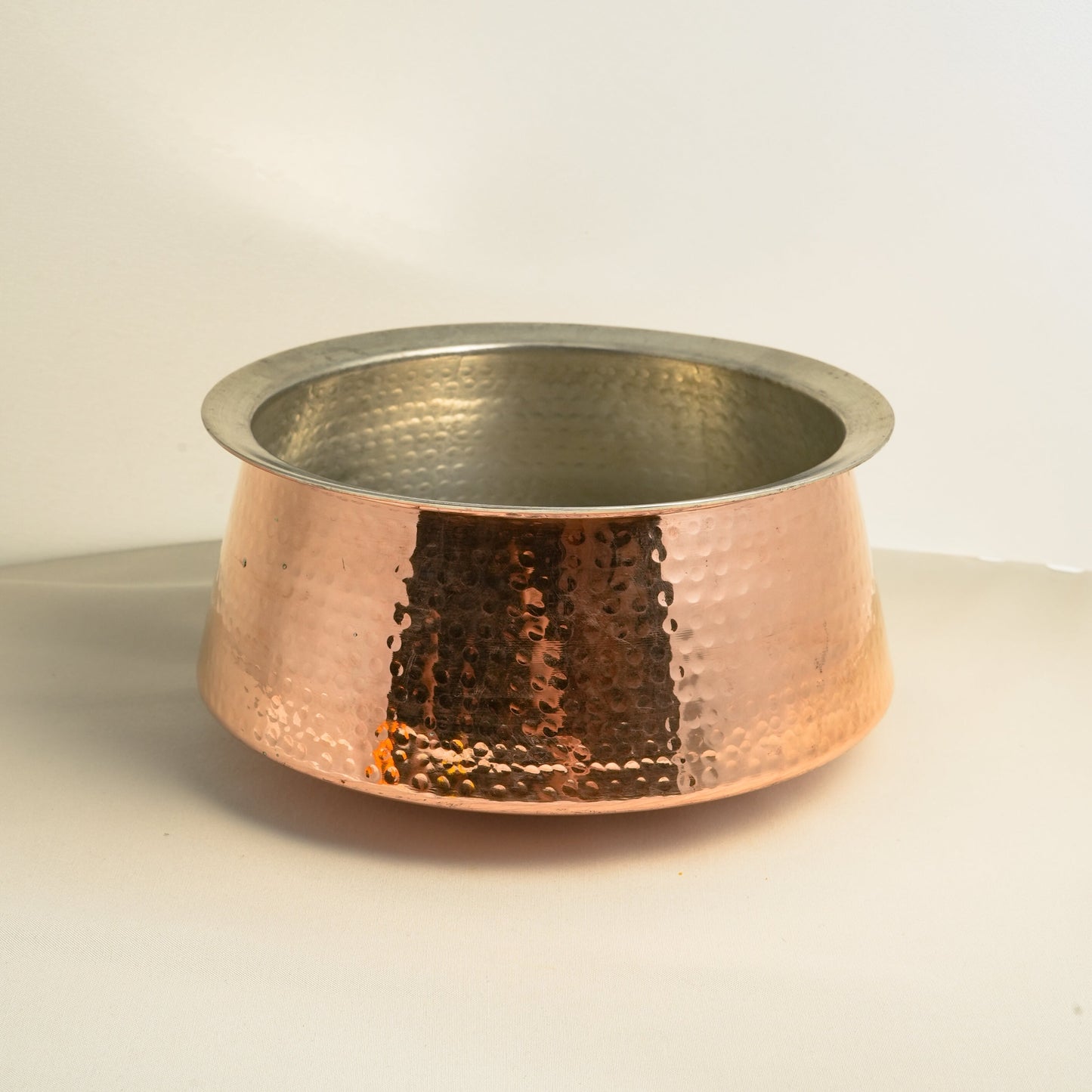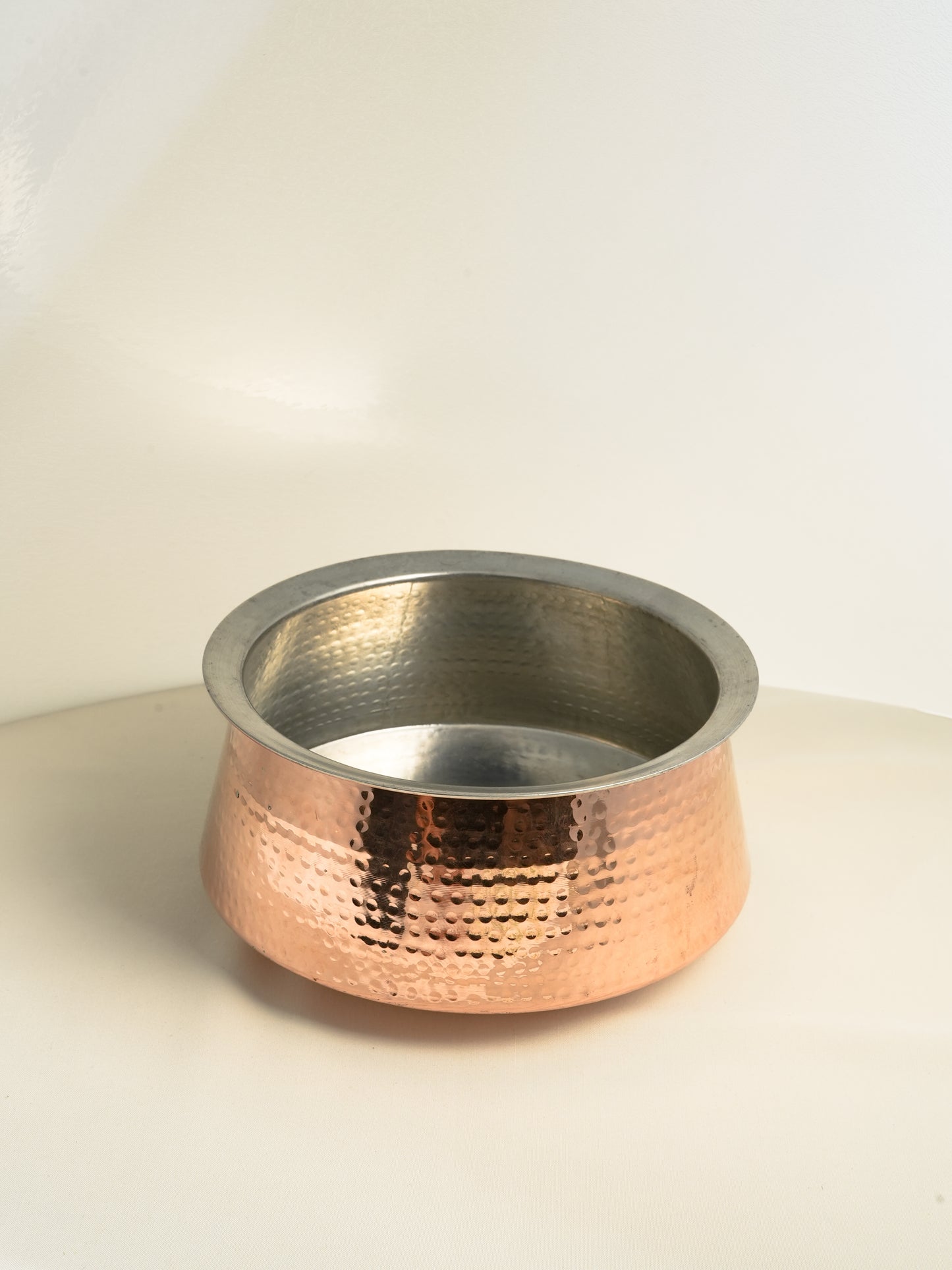COPPER DEGCHI
COPPER DEGCHI
Traditional copper pot for cooking dals, rice, or gravies. Even heating and a heritage-rich presentation.
Couldn't load pickup availability
Product Description
Product Description
Net Quantity - 1N
Your Order Contains - 1 pc Copper Degchi
Weight - 1.5kg
Capacity - 4L
Height - 12cm
Diameter - 25cm
Finish: Handcrafted in pure Copper, Tin coated inside
Note: Any variation in weight and size is characteristic of handcrafted products.
Usage and Benefits
Usage and Benefits
Usage & Historical Context
The copper degchi is a round-bottomed cooking pot used in traditional Indian kitchens for preparing rice, dals, and gravies. Found in royal Mughal kitchens and Rajasthani havelis, it was prized for its heat conductivity and compatibility with dum-style (slow) cooking. These degchis were often tinned inside to ensure safe cooking.
Benefits
Excellent for slow-cooked meals due to uniform heat distribution. The degchi’s shape prevents sticking or burning, making it perfect for khichdi, dal, or sweets like kheer. Lined with food-safe tin, it’s ideal for regular use. The copper body adds a touch of heritage to your kitchen while improving energy efficiency.
Clean and Care
Clean and Care
Copper is a living metal — it reacts to air, moisture, and heat. Over time, it develops a natural patina, which is part of its charm. With regular care, your copperware will stay beautiful and functional for years.
Daily Use Care
Rinse and wipe after every use: Use mild dish soap and lukewarm water. Dry immediately with a soft cloth to avoid water spots.
Avoid acidic foods in unlined copperware (e.g., tomato, lemon, tamarind) as copper reacts with acids.
For lined cookware (tin or stainless steel), treat the lining gently—do not scrub aggressively.
Weekly or Occasional Cleaning
1. Natural Cleaning Methods
Lemon & Salt: Cut a lemon, dip in salt, rub the surface, rinse with water, and dry thoroughly.
Vinegar & Salt Paste: Mix equal parts white vinegar and salt, apply with a soft cloth, rinse, and dry.
Tamarind Pulp: Gently scrub with soaked tamarind pulp to remove tarnish and bring back shine.
2. Pitambari Powder (Recommended)
Safe and effective for copper polishing.
Apply a small amount of Pitambari with a damp cloth or sponge.
Rub gently, rinse with clean water, and wipe dry.
Do not use on tin-lined or lacquer-coated areas.
Copper Drinking Water Vessels (Glass, Jug, Lota, Jar)
Clean regularly to avoid copper oxide buildup.
Avoid storing water in copper for more than 8–10 hours.
Never store milk, juices, or acidic liquids in copper vessels.
Rinse and dry every morning before refilling.
Storage Tips
Keep in a dry, ventilated area.
For unused items, wrap in cotton or muslin cloth to avoid darkening due to oxidation.
Don’t stack wet copper items to prevent spotting or green marks (verdigris).
Optional: Natural Patina vs. Polished Look
Some people love the antique patina that forms over time — it's safe and aesthetic.
If you prefer a polished look, clean more frequently with Pitambari or natural methods.
Share
- Free shipping
 Easy 7 days Exchange
Easy 7 days Exchange
 faster delivery
faster delivery
- 100% Pure
- packaged
- Genunine






